Hunter Hayes talks guitars, demoing and playing with the greats
"I've gotta constantly push myself beyond where I think, 'OK, I'm good.'"
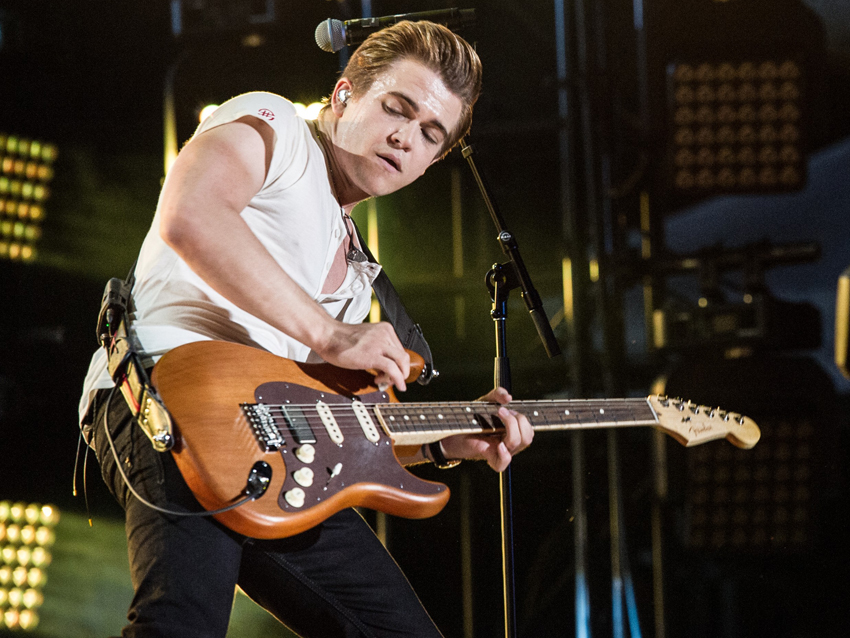
Hunter Hayes talks guitars, demoing and playing with the greats
At any given moment, there’s a crowded field of young acts clamoring for their shot at mainstream country stardom. But it wasn’t at all hard to pick Hunter Hayes out of the throng when he signed to Atlantic in his late teens. Here was a Louisiana-bred, baby-faced, total package. He was writing sensitive, hooky, high-gloss country-pop songs, singing them with ardent, R&B-slicked agility and amassing a fan base whose youth was only equaled by Taylor Swift’s.
Even more impressively, he’d recorded his label debut with studio guitar guru Dann Huff co-producing, and the sessions didn’t even require Huff to play a lick. Hayes had every guitar solo covered. Ditto every rhythm guitar part, bass line, drum groove and keyboard track. This kid had already been developing his chops for most of his life, and there was video footage of his preschool-age appearance with Hank Williams, Jr. to prove it.
After the Top 10 country singles started coming, his self-titled album saw an expanded reissue and one of his guitar heroes, Brad Paisley, invited him to sit in on an album track, Hayes doubled down on the completeness, polish and punch of his craft with this year’s Storyline and his first tour as an arena headliner. He talks about it all with the expertise and authority of a seasoned pro – because that’s what he is. (You can purchase Hunter Hayes' Storyline on iTunes or at Amazon.)
Already you’ve been earning a reputation as a performer who pays exacting attention to detail, who’s integrally involved in every facet of the show. Why is that so important to you?
“Well, I’ve wanted to do arenas since before I could form words. In Lafayette, Louisiana, artists went to three places, right? They either played the arena – and we had two – or they played a club. And I was a kid, so I couldn’t get into any of the bars. Every now and then they did the theater, but it wasn’t really set up for a touring band to come through. So my only experience of concerts was at an arena. In my mind, the ultimate show was an arena show.
“I’ve been wanting to do that my whole life, so my thing is, if you get the chance to stand on stage in an arena with your name on the sign, you owe it to every single person there to put in extra effort. You owe them a surprise.
“And I love it. I love production. I love just sitting down with the band and doing arrangements for a couple days at a time, and then jumping into lighting and production and having a moving stage. It’s more than just a set list, some lights and a room. It’s gotta be an experience. It’s gotta be something you walk away remembering for the rest of your life.”
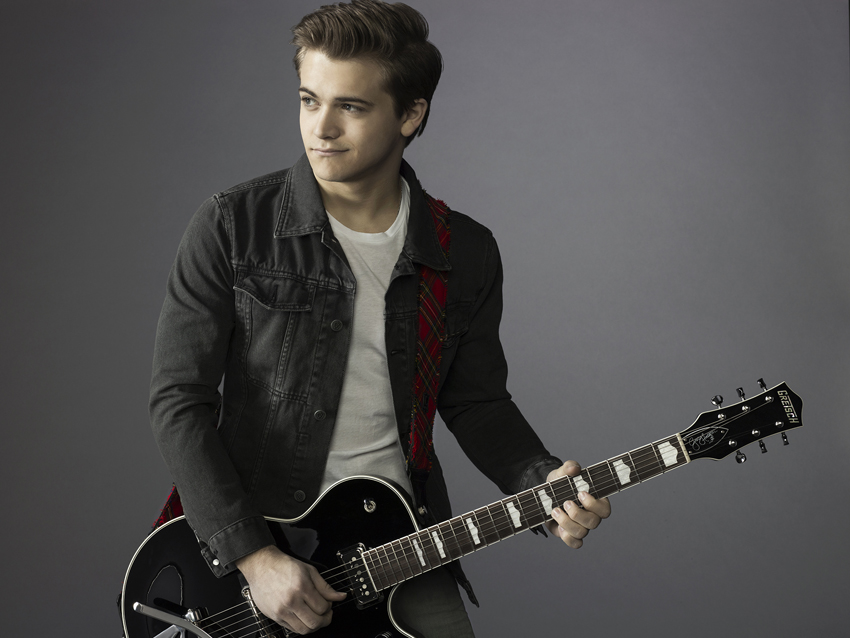
On demoing
You recorded Storyline with your touring band. But you famously played 32 instruments on your self-titled debut for Atlantic and really drove that home visually in the music video for your first single, Storm Warning. What difference did it make that you established a rep as a multi-instrumentalist right out of the gate?
“That’s just how I was used to making demos. And that’s the only way I was gonna find who I was. If we got a bunch of total pro players in Nashville or whatever, all the guys that make these hit records, if they were all playing in a room and I was behind the console quote-unquote producing the record, I would’ve been so nervous and I would’ve never spoken up. I would’ve deferred to the professionals. I would’ve just let them make the record, you know? And that kinda defeats the purpose of making a record. You make a record to be a voice, to find your voice. And we thought it would be a fun thing to kinda play on it for the first music video.”
I was able to find plenty of videos of you performing from childhood through your teens. In the early ones, you’re a precocious kid impressing the adults with a level of ability far beyond what they’d expect from someone your age. But at some point along the way, you really began speaking to your peers with your music. It’s a unique thing, especially in the context of country music, to have so many young fans who feel like you’re speaking to them.
“Anytime you write a song, anytime you step in the room and you’re writing something about your life, that is the dream – that anyone can listen to it and relate to it, because they’ve either been there or they know somebody who has. That is the dream come true, when you have things happen like what’s happened with the song Invisible, with the stories that we’ve gotten from fans. That song is a story that has already happened to me, being the geek and then finding my place to fit in on stage. At the same time, even after the song was released I was still experiencing more chapters of that story. That’s the cool thing, when a fan comes to you with a story and says, ‘Hey, this is how the song really affected me.’”
In a lot of the old performing videos, you’re not necessarily playing guitar – you’re playing accordion and doing Cajun dance music. There’s more of a regional flavor to those performances. Now you’re known primarily as a guitarist, and the appeal of your music isn’t tied to region. When and how did you navigate that transition?
“I don’t really know – that’s the thing. That’s kind of the fun part, really. Every demo that I make has a different goal. If the demo was recorded two weeks ago, it would sound like something else. Because it was recorded today, it sounds kinda like I’ve been listening to this record. That kinda stuff happens so much it’s ridiculous. But it’s fun. That’s the search. You’ve gotta give the fans something new, and you’ve gotta search. You try stuff on demos that doesn’t really work, and then you forget about it and walk away from it, then try it again later – or you learn something from the process. I just like the fact that it’s always changing. I like the fact that every week I’ve got a different record that I’m absolutely obsessed with and have on repeat.”
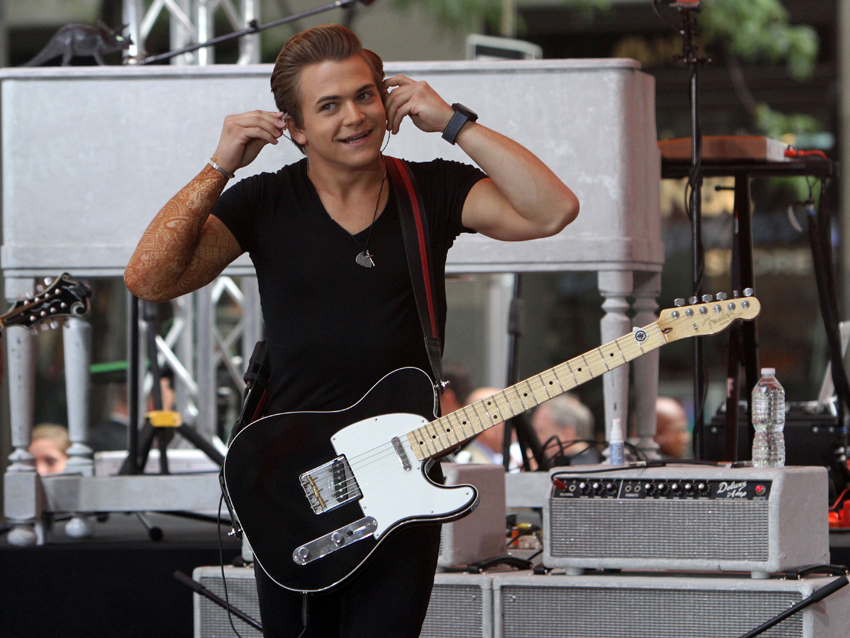
A "hard attack" on guitar
Do you remember when you turned your focus to guitar?
“Yeah. I got a guitar when I was six. And I think in my middle school years I was definitely spending a little bit more time on guitar. But I never had a really good guitar setup. I didn’t have a good amp to go with the guitar, all that stuff. It was always kind of a messy scenario – I didn’t really have an amp that worked. Little things would kind of keep me from being inspired to play. But when I got into high school, I think, was when I really started wanting to be more of a guitar player. That’s when I really got obsessed with it, I guess. That’s when it became my primary instrument, my heart and soul.”
It became kind of a signature for you to treat some of your instruments like chalkboards, to write your song lyrics on one of your Strats and your piano. Where did that idea come from?
“Honestly, that was more or less just a set piece thing. I didn’t have the budget or the room – I was traveling with a bus and a trailer for the longest time, like everybody, right? And I wanted so badly to show up to a show and have a look, have a set. I couldn’t afford a set. I’ve seen people that paint on their backline and make it a thing. I said, ‘Well, why don’t we just paint all the stuff that’s on stage? That way we always have a look. Even if we don’t have a lighting setup or whatever, at least we have a theme.’ So we keep doing it.
“Right now it’s all white with graffiti on it, sort of a white brick wall kind of thing. With the chalkboard stuff, it was like taking a page out of the notebook and just writing the lyrics everywhere, the idea that maybe that’s how the songs were written. I liked the way that allowed the lyrics to kind of be a thing. It was about the music; it was about the songs. That’s how the live experience was constructed – you were stepping into a page out of the notebook.”
I understand you have a fairly heavy attack on guitar. What do you attribute that to?
“For one, I never really played with a pick until I moved to Nashville. I watched a guy whose name was Turtle. He was so cool. He played a Strat through a Peavey Classic 30, and it was always on the neck pickup – it was a really cool tone. I loved it because what he would do is, he would play his Strat as if he was playing steel. He was kind of fingerpicking and doing a lot of steel parts from Cajun songs. So when I started playing guitar, that’s what I learned. When I was not playing with a pick, I was just playing with my hand. So I’d have to strum twice as hard to get anything out of the guitar. Playing really hard has always been my only way to really make the guitar become more dynamic, you know? With not having good amps, you have to compensate.
“Now I’m very picky about what’s on stage, because a lot of the acoustic guitars don’t respond well to that. And a lot of pickups don’t respond well to that, either. So every amp that I’ve got has to have a ton of head room. Every guitar pickup scenario that I have has to be super dynamic and has to be super low output. I like the room to breathe, because that allows me to sort of let the instrument speak, as opposed to just kind of crunching it in with a lot of distortion and stuff like that.”
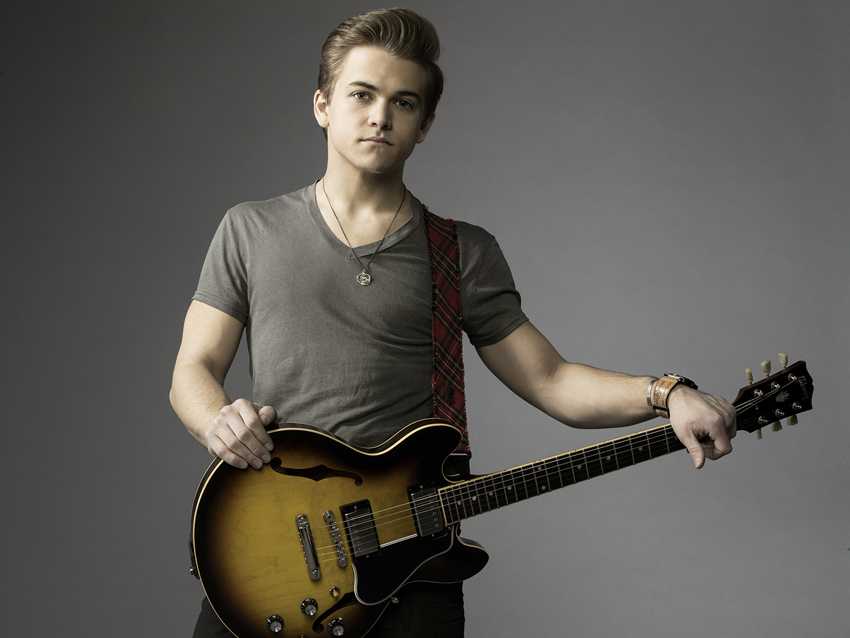
No whammy bars
You really get around on stage during your shows. How does that mobility affect your decisions about which guitars to play, tunings, even removing the whammy bar?
“I hate tremolo bars, to be begin with, because I hit so hard. I’ve just never had a good experience with one. You know what I mean? When I was playing with them, I was playing really inexpensive guitars that weren’t set up very well, so any variable I could take out of the equation, I did.
“Moving on stage, yeah, there’s a lot of things. I’ve tried acoustic guitars that are open-tuned, which I still do a lot for a couple songs, because I really wanted to play the riff, but then I just wanted to run around with a mic with a guitar on. So I’m kinda covering a big strummy thing in the chorus, and it allowed me to do a lot of the verse pickups, because they’re all kind of in the same key. That open tuning has been really fun.
“There’s that, and then guitar-wise my setup honestly got a bit simpler. A lot of times with my running and whatever, I still have my pedalboard with me. It’s not sitting off stage – it’s still right there in front of me. I’ve been learning a lot about volume on a guitar. Because that’s one of those things you don’t really want to have to think about during a show. It’s an infinite variable that could really mess you up. [Laughs]
“I have guitars that I love. For one, I’ve got the Rick Turner that I love, because it’s got a parametric EQ that is, obviously, active. So you can turn that on to get a really cool lead tone out of it. You drive the amp a lot harder, and you choose the frequency you really want to accentuate, which for me and that guitar, are the really mid-range, Les Paul, sort of honky kind of things for a lot of the electric stuff. Then it’s got this really quiet part, so I turn that off and have this really cool middle pickup kind of thing. The Rick Turner is such a versatile instrument. Well, it’s kind of a one-trick pony. But it is so good at that one thing that nothing else comes close.
“I play a lot of single-coil things throughout the night. I don’t play a lot of humbucker stuff. I play a lot of Strats and Teles. I have one guitar that I play on a lot of songs, and it’s called a Serpentine, made by Mario Martin in Murfreesboro. It’s his take on a Mustang, but he puts a Tele bridge on it, so it’s got that spank, that Tele thing, and it’s Strat scale, sort of a long-scale neck. ‘Cause I can’t play short-scale necks – they drive me crazy. I bend the strings way too much. But he’s got humbuckers in it, so it’s got the attack of a Tele and the sustain of one of those really cool, saturated rock guitars. So it’s a perfect combination. I play it on probably 30 percent of the set.”
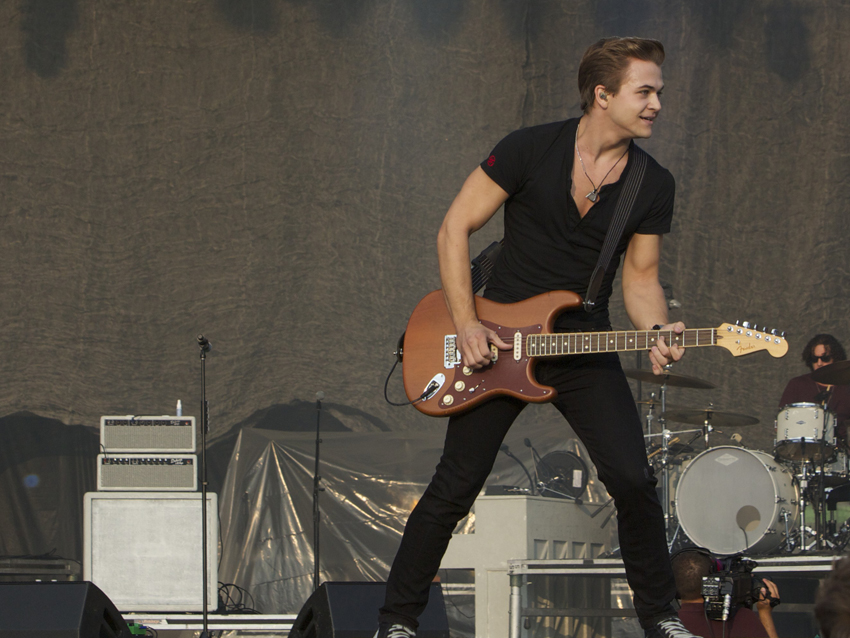
Going mobile
I recently saw you perform a tribute to Ronnie Milsap at the Country Music Hall of Fame. I know you’ve been covering a couple of his songs live and featured him as a guest when you played the Ryman. What did you learn from him about working elements of groove-driven pop and smooth R&B into country?
“I think it was his song Smoky Mountain Rain I heard on the radio one time, and then it was like, ‘Whoa, I’ve gotta get his catalog.’ Then I bought 40 #1 Hits, right? And that’s all I listened to for, like, a year. I loved There’s No Gettin’ Over Me, with that kind of groove. [He sings a syncopated, laidback backbeat.] I just liked the way he combined a lot of my favorite things – Motown sounds with incredibly, incredibly clear and crisp control of a voice that I really wish I had. I just like the way he marries those worlds, you know?”
On the Academy of Country Music Awards and Dancing With the Stars you were paired with another musician from before your time, Stevie Wonder. What do you think made that a good fit?
“I think one thing that we really have in common is that we both just always wanna do music. We both just have that thing where every minute of the day, we’re trying to find another way to make noise. He had a keyboard plugged into an amp in his dressing room. He’d come off stage and he’d be jamming. You’d hear him in between the segments. I know that feeling. I’ve got a mandolin in my dressing room at all times. On the bus, I’ve got my little recording rig, so that when I get back in I can finish up some demos.”
You do some more contemporary R&B vocal runs. Who are some of your important vocal reference points?
“I find myself doing a lot of emulating – trying to emulate – a lot of Michael Buble and John Legend. I got the opportunity to work with John Legend, actually, just recently. I got to produce a version of All Of Me. My band and I played kind of a bluegrass thing, a version of his song for the CMT Awards.
“It’s so funny because I listen to his stuff a lot, but it’s not something I would immediately think of as a reference. But then I catch myself every night doing stuff that you can totally hear I’ve been listening to John Legend. I listened to a lot of Ronnie. I listened to a lot of Marty Roe from Diamond Rio when I was growing up. A lot of Bryan White.
“And there’s a little bit of Gary LeVox. For a while, I listened to Rascal Flatts records. But I listened to a lot of Joe Nichols for a minute, too; kind of tried to get the low part of my voice developed by listening and singing along with him. A lot of Ryan Tedder, too. I’m listening to a lot of One Republic stuff lately. I got to work with him a year ago, which was great.”
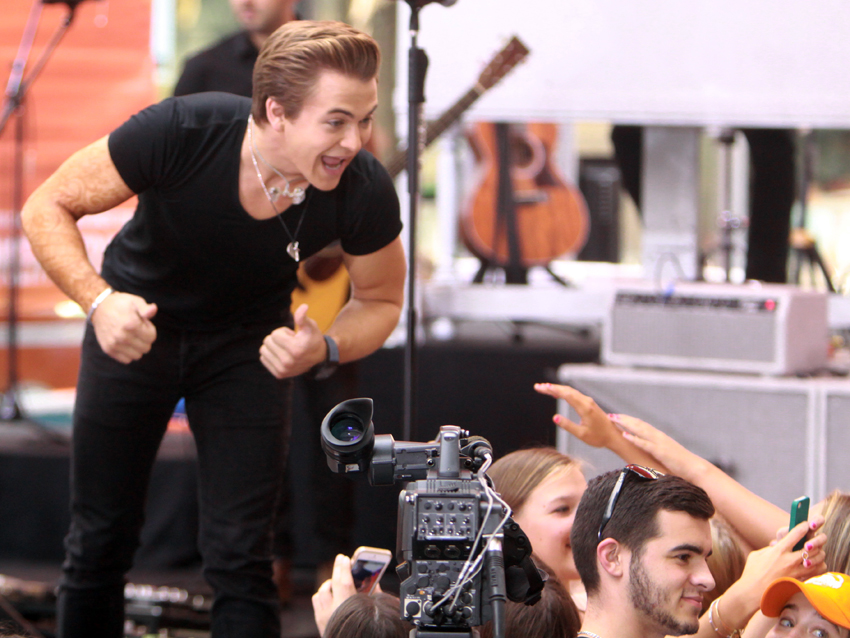
On singing
It’s clear that you haven’t just honed your playing at the expense of your singing. You’ve been working at both for many years.
“I spent my entire life looking forward to the day when I had 200 shows a year on my route sheet. And I’ve got a little bit more than that last year and this year. It is astonishing, though, when your voice tells you, ‘I don’t think so.’ [Laughs] You have to learn what it needs and all that stuff. Mine, I’ve got a lot of different things that I deal with. It’s extremely dry. I’ve got, like, three humidifiers in the bus going right now. I’ve gotta do my warm-ups and I can’t talk too much during the day either, because that kills your voice.
“I’m slowly learning the things I feel like I really need to learn. I’m not as consistent vocally as I really wanna be, and I work really, really hard on it every day. I feel like I’m definitely turning the corner on discoveries when it comes to my voice and where it wants to sit. I try to make sure that every night when I walk on stage for the fans, I’ve got a consistent performance for them.”
I’ve noticed that when you talk about your formative years, you place equal emphasis on all the live performing you’ve done since you were little and all the time you spent wood-shedding in your bedroom, working with recording gear, figuring out how to record demos. Where did that sense of professionalism come from?
“I think just the fact that there’s no other options for me. [Laughs] I gotta give everything I’ve got, and I wanna give everything I’ve got and more – find what I don’t have and give that, too. Because this is all I know and this is how I wanna spend the rest of my life, doing this and putting on these shows and making these records and writing these songs and working on these demos. I've gotta constantly push myself beyond where I think, ‘OK, I’m good.’ No, you’re not. You’re never good. You’re never done. You know? My manager says that just comes from the ‘no plan B’ thing. There’s one thing you wanna do for the rest of your life, so don’t give yourself the option to walk away from it.”